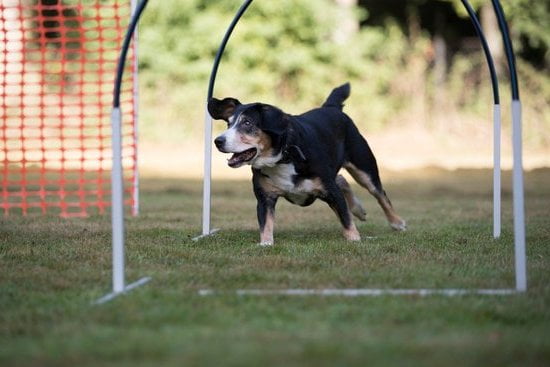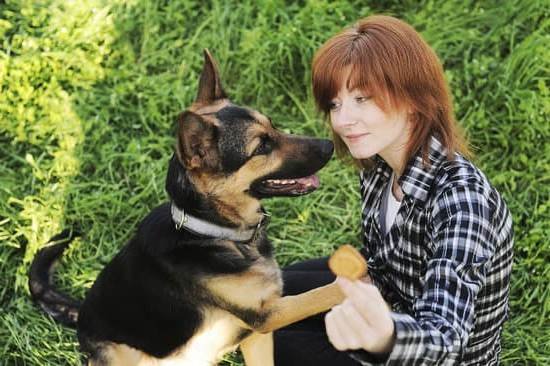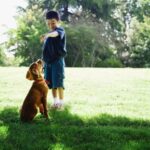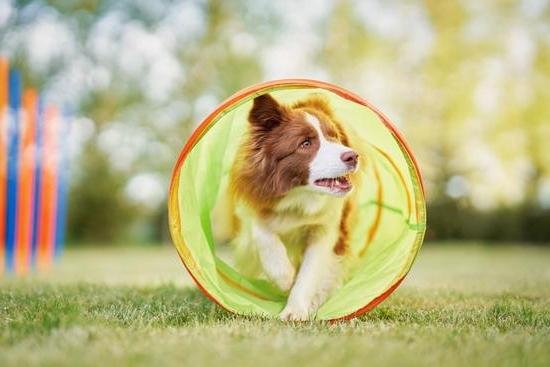When it comes to training puppies, many dog owners often overlook the potential benefits of incorporating adult dogs into the process. Socialization and training are crucial for a puppy’s development, and having adult dogs involved can greatly enhance their learning experience. In this article, we will explore why puppies may train better with all adult dogs and how this dynamic can positively impact their behavior and overall training progression.
Socialization is key to raising a well-rounded and confident dog. It helps them develop the necessary skills to interact appropriately with other dogs and humans. By exposing puppies to adult dogs, they learn how to communicate, play, and navigate social situations effectively. Adult dogs act as mentors for the younger ones, providing guidance on proper behaviors and helping them understand social cues.
Moreover, adult dogs serve as role models for puppies in terms of both behavior and obedience. Puppies have a natural tendency to observe and imitate what they see around them. By being around well-trained adult dogs, puppies learn valuable lessons in self-control, leash manners, basic commands, and overall good behavior. The presence of adult dogs sets a standard for behavior that puppies strive to emulate.
Incorporating adult dogs into puppy training also establishes a balanced pack structure. Dogs have an innate understanding of pack mentality, where each member has a role within the group hierarchy. This balance fosters discipline among the puppies and provides an environment conducive to effective learning. With adult dogs present in training sessions or daily interactions, puppies naturally fall into line with established rules and boundaries set by their older peers.
Overall, training puppies with adult dogs offers numerous advantages that can contribute to their growth and development as well-behaved companions. The next sections of this article will delve deeper into these benefits, discussing how adult dogs serve as mentors for puppies’ behavior modeling, aid in teaching essential communication skills, bring discipline into the equation while fostering confidence-building, and help address common behavioral issues.
Additionally, we will provide practical strategies and techniques for incorporating adult dogs effectively into puppy training sessions. By recognizing the value of this dynamic, dog owners can optimize their efforts in training their puppies towards a successful and harmonious relationship with their adult canine companions.
The Power of Role Modeling
Puppies are like sponges, eager to learn and soak up everything around them. This is why socialization and training from an early age are crucial for their development. One effective way to enhance their training experience is by incorporating adult dogs as mentors. Adult dogs can serve as excellent role models for puppies, teaching them important behaviors and helping them progress in their training journey.
Learning through Observation
Puppies learn primarily through observation and imitation, making adult dogs natural teachers. When a puppy sees an adult dog perform a certain behavior, they are more likely to imitate it themselves. For example, if a puppy witnesses an adult dog sitting on command, they are more inclined to try it themselves. This process of observational learning can speed up the training process immensely, as puppies see firsthand how desired behaviors should be performed.
Adult dogs can also demonstrate appropriate manners and behavior during interactions with other dogs and humans. Puppies pick up on these cues by observing the adult dogs’ body language and responses. They learn how to read social signals and engage in proper play etiquette. Through consistent exposure to well-behaved adult dogs, puppies can develop good manners and become better-rounded individuals.
Influencing Behavior Progression
The presence of an adult dog can positively influence a puppy’s behavior development and training progression. Being part of a pack helps establish balance within the group, which translates into better discipline for puppies. Adult dogs naturally assume leadership roles within the pack hierarchy, which gives puppies clear guidance on what is expected from them.
Adult dogs act as mentors by teaching younger ones appropriate boundaries. Puppies quickly understand that certain behaviors may result in reprimands from older pack members if they overstep their limits. With consistent reinforcement from adult dogs, puppies can learn self-control and impulse management quicker than when they are trained alone.
In addition, interactions with confident adult dogs can boost a puppy’s self-confidence. Puppies feel secure knowing there is an adult dog to look up to and seek guidance from. This confidence enables them to explore new environments, overcome fears, and navigate unfamiliar situations more easily. Adult dogs provide reassurance and support for puppies, helping them develop into well-adjusted individuals.
Adult dogs are invaluable assets in a puppy’s training journey. They serve as role models, teaching behaviors through observation. Their presence helps establish a balanced pack structure and aids in setting boundaries and discipline for the puppies’ benefit. Furthermore, adult dogs assist in building confidence and addressing behavioral issues that may arise during training. By incorporating adult dogs into the training sessions, puppies have the opportunity to learn from experienced mentors and progress more effectively.
Creating a Balanced Pack
When it comes to training puppies, incorporating adult dogs into the process can have a significant impact on their development. Not only does it help with socialization, but adult dogs can also play a vital role in establishing a balanced pack structure, which ultimately benefits puppy training.
One of the key concepts in dog training is pack mentality. Dogs are naturally pack animals, and they thrive on structure and hierarchy. By introducing adult dogs into the mix, puppies have the opportunity to learn and understand their place within a pack. This helps them develop important social skills and prepares them for interactions with other dogs throughout their lives.
In order to create a balanced pack, it is important to establish clear leadership roles among both the adult dogs and puppies. Adult dogs provide valuable guidance for puppies by modeling appropriate behaviors and setting boundaries. Puppies are quick learners and will often imitate what they see from their adult counterparts. This is an effective way for them to grasp basic obedience commands and understand how to behave in different situations.
To incorporate adult dogs into puppy training sessions effectively, there are several strategies that can be employed. One approach is to set up joint activities where both adult dogs and puppies can interact together.
This could include group walks or supervised play sessions where they can learn from each other’s behavior. It is also beneficial to have separate one-on-one training sessions for both adult dogs and puppies, focusing on individual needs while still fostering a sense of unity within the pack.
By creating a balanced pack through the inclusion of adult dogs in puppy training dynamics, puppies not only learn essential skills but also gain confidence and overcome behavioral issues more effectively. The presence of mature role models helps shape their behavior positively while providing discipline when needed. Maximizing the potential of this powerful dynamic will result in successful puppy training outcomes that lay a solid foundation for a well-rounded canine companion.
Enhanced Social Skills
Puppies are naturally social animals and learning how to communicate effectively is an essential skill for their development. Interacting with adult dogs can greatly enhance a puppy’s social skills and improve their ability to communicate with other dogs and humans. Here are some ways in which interacting with adult dogs can benefit a puppy’s communication:
- Learning body language: Adult dogs serve as excellent teachers when it comes to understanding body language. Puppies who interact with adult dogs observe and mimic their body postures, facial expressions, and tail movements. This helps puppies become more aware of nuanced signals that indicate friendliness, dominance, fear, or submission. By learning how to read and interpret these cues, puppies can avoid potential conflicts and develop better social skills.
- Developing appropriate play behavior: Play is an important part of a puppy’s life, as it helps them learn about boundaries and communication through interactive experiences. Interacting with adult dogs allows puppies to understand the rules of play by observing proper play styles, such as bite inhibition and taking turns. Adult dogs can gently correct puppies if their play becomes too rough or assertive, teaching them how to control their impulses and adjust their behavior accordingly.
- Understanding communication cues: Adult dogs can help teach puppies the different vocalizations and non-verbal cues they use to communicate various needs or emotions. Puppies who frequently interact with adult dogs learn to recognize when another dog wants to play, needs space, or feels anxious or scared. By understanding these cues, puppies can respond appropriately and effectively communicate their own intentions or feelings.
To incorporate adult dogs in enhancing a puppy’s social skills during training sessions, consider the following techniques:
- Organize supervised playdates: Arrange controlled play sessions between the puppy and well-behaved adult dogs in a safe environment to allow for positive interaction.
- Encourage parallel activities: During training exercises or obedience sessions, have the puppy alongside an adult dog engaging in similar tasks so that the puppy can observe and learn from the adult dog’s behavior.
- Practice group walks: Walking puppies with adult dogs in a group setting allows them to learn proper leash manners and socialize with other dogs, which contributes to improved communication skills.
Overall, interacting with adult dogs is highly beneficial for a puppy’s social development. As puppies navigate their way through life, the presence of adult dogs helps them acquire vital communication skills and build strong foundations for healthy interactions with both dogs and humans.
Instilling Discipline
Discipline is a crucial aspect of puppy training as it helps establish boundaries and teach puppies appropriate behavior. One effective way to instill discipline in puppies is by incorporating adult dogs into their training process. Adult dogs can play a significant role in setting boundaries and teaching puppies self-control.
When it comes to teaching boundaries, adult dogs have a natural ability to communicate and enforce rules. Puppies learn by observing and imitating adult dogs, who can demonstrate what is acceptable behavior in various situations. For example, if a puppy is exhibiting inappropriate chewing behavior, an adult dog can step in and redirect the puppy’s attention towards appropriate chew toys. By witnessing the correct behavior modeled by the adult dog, the puppy learns what is expected of them.
Adult dogs also help teach puppies self-control. Puppies are known for their boundless energy and lack of impulse control. However, through interaction with adult dogs, they can learn how to regulate their excitement levels and behave appropriately in different situations. Adult dogs can gently correct undesirable behaviors like jumping or excessive barking by displaying calm and well-mannered conduct themselves.
To further aid in disciplining puppies, it’s essential for owners to set consistent boundaries and reinforce them with positive reinforcement techniques. Consistency allows puppies to understand what is expected of them, while positive reinforcement motivates desired behaviors. Combining these approaches with the influence of adult dogs creates a comprehensive disciplinary framework that sets puppies up for success.
Building Confidence
Interaction with confident adult dogs can have a significant impact on the development of a puppy’s self-confidence. When puppies observe adult dogs navigating new environments, handling different situations, and exhibiting calm and confident behavior, they are more likely to feel secure and comfortable themselves. This interaction helps foster a stronger sense of self in puppies as they learn from the adult dogs’ confidence and apply it to their own experiences.
Confidence is crucial for puppies as they grow and encounter various stimuli and challenges. By observing how adult dogs handle unfamiliar objects or loud noises without fear or anxiety, puppies gain reassurance that those things are not threatening. This helps them build resilience and become less likely to develop fears or phobias later in life.
Additionally, adult dogs can play an essential role in helping puppies overcome specific fears or anxieties they may already have. For example, if a puppy is scared of water, an adult dog who enjoys swimming can help the puppy build trust and confidence in the water through positive reinforcement. The presence of a confident adult dog provides support and encouragement for the puppy to face its fears.
Overall, including adult dogs in the training process contributes to creating well-rounded, confident puppies who are better equipped to handle new situations as they mature. This strong foundation of self-assurance sets them up for success in future training endeavors and in their overall well-being.
| Benefits of Adult Dogs in Building Puppy Confidence |
|---|
| 1. Adult dogs serve as positive role models for confident behavior. |
| 2. Puppies learn from observing how adult dogs navigate various situations without fear. |
| 3. Interaction with confident adult dogs helps puppies become resilient and less likely to develop fears or phobias. |
| 4. Adult dogs support puppies in overcoming specific fears or anxieties through positive reinforcement. |
Addressing Behavioral Issues
Having a well-behaved and obedient puppy is the goal of every dog owner. However, puppies often exhibit behavioral issues such as biting, chewing, or excessive barking. These problems can be frustrating for owners and detrimental to the overall training progress. Fortunately, adult dogs can play a crucial role in helping address and correct these puppy problems.
Identifying Common Behavioral Issues
Before understanding how adult dogs assist in correcting puppy problems, it’s important to identify some common behavioral issues that puppies experience. One common problem is biting, which is a natural behavior for puppies but can become problematic if not addressed early on.
Chewing furniture or shoes is another issue that puppies often engage in as they explore their surroundings and alleviate teething discomfort. Excessive barking is yet another problem that can occur when puppies are anxious, bored, or seeking attention.
Corrective Behavior Modeling
One of the most effective ways adult dogs assist in correcting puppy problems is through corrective behavior modeling. Puppies learn by observing and imitating their adult counterparts. When an adult dog exhibits appropriate behavior, such as being calm or ignoring unwanted behaviors from the puppy, it sends a clear message to the young pup. Through these interactions, puppies begin to understand what is acceptable and what is not.
For example, if a puppy starts biting too hard during playtime with another dog, the adult dog may yelp or walk away as a way of signaling that the behavior was too rough. This teaches the young pup that gentle play is desired, while rough play will result in loss of attention or social interaction.
Similarly, when an adult dog remains calm during instances of excessive barking from the puppy, it demonstrates that constant barking does not yield any desirable outcomes.
By having adult dogs model appropriate behavior and set boundaries with puppies, owners can leverage this natural aspect of canine socialization to correct and shape the behavior of their young dogs in a positive and effective way.
Supplementing Training Techniques
While adult dogs act as correctors for puppy problems, it’s important to supplement their efforts with proper training techniques. Owners should continue with consistent training sessions that focus on reinforcing desired behaviors, addressing concerning behaviors promptly, and providing positive reinforcement when the puppy responds correctly. Incorporating reward-based training methods alongside the guidance from adult dogs creates a comprehensive approach to resolve behavioral issues effectively.
Overall, adult dogs play a crucial role in addressing and correcting puppy problems by modeling appropriate behavior and setting boundaries. Their guidance can expedite the training process and help shape well-behaved puppies.
It is important for owners to understand common behavioral issues in puppies and leverage the power of canine socialization to create a harmonious environment that supports effective training outcomes. By incorporating adult dogs into the training process, owners can successfully address these problems and lay the foundation for well-rounded and disciplined canine companions.
Training Techniques
Incorporating adult dogs into puppy training sessions can be a highly effective way to enhance the learning experience for puppies. By providing role models, establishing a balanced pack structure, improving social skills, instilling discipline, building confidence, addressing behavioral issues, and utilizing specific training techniques, adult dogs can play a crucial role in shaping well-trained and well-behaved puppies.
One strategy for incorporating adult dogs into puppy training is through role modeling. Puppies learn by observing and imitating the behaviors of older dogs. By having well-trained adult dogs present during training sessions, puppies can observe proper behaviors such as sitting, walking on a leash, and following commands. This allows them to learn through imitation and increases their chances of quickly grasping the desired behaviors.
Another strategy is establishing a balanced pack structure. Dogs have inherently hierarchical instincts that revolve around pack mentality. By including adult dogs in puppy training sessions, the natural order of things can be established more easily. The adult dogs can provide guidance and enforce boundaries, which helps create a sense of order and balance within the puppy training environment.
When incorporating adult dogs into puppy training sessions, it is important to focus on developing social skills. Interaction with adult dogs teaches puppies appropriate body language, play behavior, and communication cues. This not only helps them navigate social situations with other dogs but also improves their overall communication skills with humans.
To effectively incorporate adult dogs into puppy training sessions, trainers can utilize specific techniques such as controlled socialization exercises or parallel walking. Controlled socialization exercises allow puppies to interact safely with well-mannered adult dogs under supervision to develop positive social behaviors. Parallel walking involves having both an adult dog and a puppy walk side by side on leashes to reinforce loose leash walking and provide visual reinforcement for the desired behavior.
Conclusion
In conclusion, incorporating adult dogs into the training process can greatly enhance the overall effectiveness of puppy training. The power of role modeling cannot be understated, as puppies learn by observing and imitating adult dogs. By having adult dogs as mentors, puppies are able to develop positive behaviors and progress in their training more quickly.
Furthermore, the presence of adult dogs helps establish a balanced pack structure, which is important for effective puppy training. Dogs naturally have a pack mentality, and by introducing adult dogs into the training dynamics, puppies are able to understand their place in the hierarchy and follow the lead of the adult dogs.
Interacting with adult dogs also improves a puppy’s social skills and communication abilities. Adult dogs can teach puppies important cues for appropriate play, body language, and communication signals. This not only helps puppies form better relationships with other dogs but also with humans.
Adult dogs play a crucial role in teaching boundaries and discipline to puppies. Through corrective behavior modeling, adult dogs can aid in correcting common behavioral issues such as biting or chewing. They help teach puppies appropriate behavior and self-control, setting them up for success in their training.
Overall, training puppies with adult dogs is a powerful way to maximize their learning potential. By taking advantage of this dynamic duo, puppy owners can ensure that their furry friends receive the best possible start in life. So whether it’s through role modeling, pack structure establishment, enhanced social skills development, or boundary setting, incorporating adult dogs into puppy training sessions is a strategy that should not be overlooked by any responsible dog owner.
Frequently Asked Questions
Is it easier to train a puppy with an older dog?
Training a puppy with the help of an older dog can have advantages, but it may not necessarily make the process easier. Having an older dog around can provide a positive influence for the puppy to observe and learn from, such as appropriate behavior and commands. The older dog’s presence can potentially accelerate the learning curve for the puppy in terms of socialization and obedience training.
However, it is important to note that puppies still need consistent and dedicated training from their human owners. While an older dog can serve as a mentor, it does not remove the responsibility of actively training and guiding the puppy.
Do older dogs do better with puppies?
Older dogs generally tend to be more patient and tolerant towards puppies, which can create a better environment for them to coexist. The experience and maturity of an older dog often result in them being more adaptable and capable of handling some of the challenges that come with having a young pup around.
They are likely to have encountered various situations throughout their lives, which makes them less reactive or overwhelmed by a curious and energetic puppy. Older dogs can act as role models for proper behavior and help establish boundaries for puppies, leading to faster learning when it comes to housebreaking or basic commands.
What age is puppy hardest to train?
The age at which puppies are most challenging to train varies depending on several factors, including breed, individual temperament, and consistency in training efforts. Generally, during adolescence between 6 months up until 18 months old, puppies may go through a period commonly known as “the teenage phase.”
During this time, they tend to test boundaries more frequently and exhibit behaviors such as increased independence or stubbornness that can make training more difficult compared to earlier stages. However, with consistent positive reinforcement techniques, patience, clear expectations, and understanding their changing needs during this developmental stage, it is possible to successfully train a teenager pup while maintaining a strong bond with them throughout adulthood.

Welcome to the blog! I am a professional dog trainer and have been working with dogs for many years. In this blog, I will be discussing various topics related to dog training, including tips, tricks, and advice. I hope you find this information helpful and informative. Thanks for reading!





